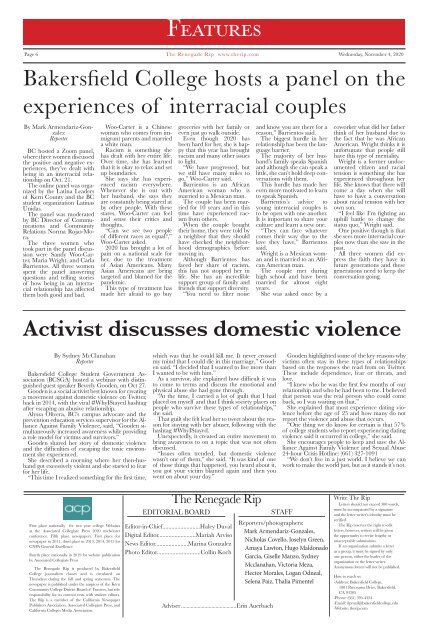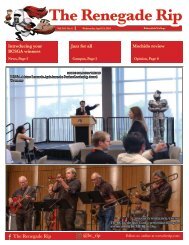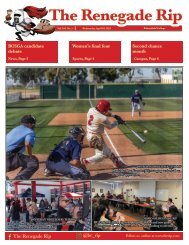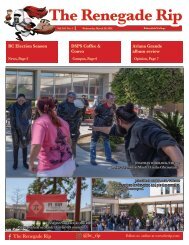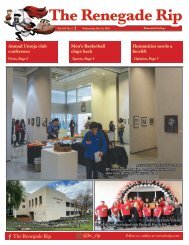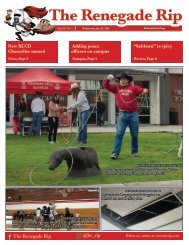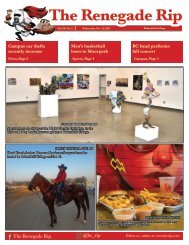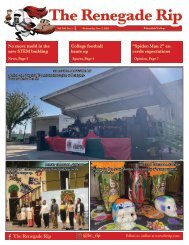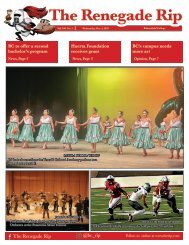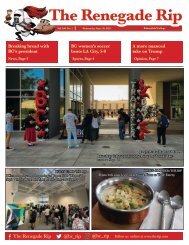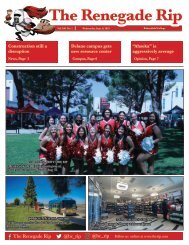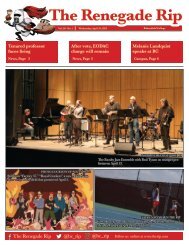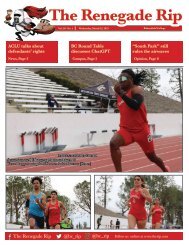Rip issue 5 Nov. 4, 2020 final
You also want an ePaper? Increase the reach of your titles
YUMPU automatically turns print PDFs into web optimized ePapers that Google loves.
Features<br />
Page 6<br />
The Renegade <strong>Rip</strong> www.therip.com<br />
Wednesday, <strong>Nov</strong>ember 4, <strong>2020</strong><br />
Bakersfield College hosts a panel on the<br />
experiences of interracial couples<br />
By Mark Armendariz-Gonzalez<br />
Reporter<br />
BC hosted a Zoom panel,<br />
where three women discussed<br />
the positive and negative experiences,<br />
they’ve dealt with<br />
being in an interracial relationship<br />
on Oct. 21.<br />
The online panel was organized<br />
by the Latina Leaders<br />
of Kern County and the BC<br />
student organization Latinas<br />
Unidas.<br />
The panel was moderated<br />
by BC Director of Communications<br />
and Community<br />
Relations Norma Rojas-Mora<br />
Ṫhe three women who<br />
took part in the panel discussion<br />
were Sandy Woo-Carter,<br />
Maria Wright, and Carla<br />
Barrientos. All three women<br />
spent the panel answering<br />
questions and telling stories<br />
of how being in an interracial<br />
relationship has affected<br />
them both good and bad.<br />
Woo-Carter is a Chinese<br />
woman who comes from immigrant<br />
parents and married<br />
a white man.<br />
Racism is something she<br />
has dealt with her entire life.<br />
Over time, she has learned<br />
that it is okay to relax and set<br />
up boundaries.<br />
She says she has experienced<br />
racism everywhere.<br />
Whenever she is out with<br />
her husband, she says they<br />
are constantly being stared at<br />
by other people. With these<br />
stares, Woo-Carter can feel<br />
and sense their critics and<br />
thoughts.<br />
“Can we see two people<br />
of different races as equal?,”<br />
Woo-Carter asked.<br />
<strong>2020</strong> has brought a lot of<br />
pain on a national scale for<br />
her, due to the treatment<br />
of Asian Americans. Many<br />
Asian Americans are being<br />
targeted and blamed for the<br />
pandemic.<br />
This type of treatment has<br />
made her afraid to go buy<br />
groceries with her family or<br />
even just go walk outside.<br />
Even though <strong>2020</strong> has<br />
been hard for her, she is happy<br />
that this year has brought<br />
racism and many other <strong>issue</strong>s<br />
to light.<br />
“We have progressed, but<br />
we still have many miles to<br />
go,” Woo-Carter said.<br />
Barrientos is an African<br />
American woman who is<br />
married to a Mexican man.<br />
The couple has been married<br />
for 10 years and in this<br />
time have experienced racism<br />
from others.<br />
When the couple bought<br />
their home, they were told by<br />
a neighbor that they should<br />
have checked the neighborhood<br />
demographics before<br />
moving in.<br />
Although Barrientos has<br />
faced her share of racism,<br />
this has not stopped her in<br />
life. She has an incredible<br />
support group of family and<br />
friends that support diversity.<br />
“You need to filter noise<br />
and know you are there for a<br />
reason,” Barrientos said.<br />
The biggest hurdle in her<br />
relationship has been the language<br />
barrier.<br />
The majority of her husband’s<br />
family speaks Spanish<br />
and although she can speak a<br />
little, she can’t hold deep conversations<br />
with them.<br />
This hurdle has made her<br />
even more motivated to learn<br />
to speak Spanish.<br />
Barrientos’s advice to<br />
young interracial couples is<br />
to be open with one another.<br />
It is important to share your<br />
culture and learn a new one.<br />
“They can face whatever<br />
comes their way due to the<br />
love they have,” Barrientos<br />
said.<br />
Wright is a Mexican woman<br />
and is married to an African<br />
American man.<br />
The couple met during<br />
high school and have been<br />
married for almost eight<br />
years.<br />
She was asked once by a<br />
coworker what did her father<br />
think of her husband due to<br />
the fact that he was African<br />
American. Wright thinks it is<br />
unfortunate that people still<br />
have this type of mentality.<br />
Wright is a former undocumented<br />
citizen and racial<br />
tension is something she has<br />
experienced throughout her<br />
life. She knows that there will<br />
come a day when she will<br />
have to have a conversation<br />
about racial tension with her<br />
own son.<br />
“I feel like I’m fighting an<br />
uphill battle to change the<br />
status quo,” Wright said.<br />
One positive though is that<br />
she sees more interracial couples<br />
now than she saw in the<br />
past.<br />
All three women did express<br />
the faith they have in<br />
future generations and these<br />
generations need to keep the<br />
conversation going.<br />
Activist discusses domestic violence<br />
By Sydney McClanahan<br />
Reporter<br />
Bakersfield College Student Government Association<br />
(BCSGA) hosted a webinar with distinguished<br />
guest speaker Beverly Gooden, on Oct 27.<br />
Gooden is a social activist best known for creating<br />
a movement against domestic violence on Twitter,<br />
back in 2014, with the viral #WhyIStayed hashtag<br />
after escaping an abusive relationship.<br />
Alyssa Olivera, BC’s campus advocate and the<br />
prevention education services supervisor for the Alliance<br />
Against Family Violence, said, “Gooden simultaneously<br />
increased awareness while providing<br />
a role model for victims and survivors.”<br />
Gooden shared her story of domestic violence<br />
and the difficulties of escaping the toxic environment<br />
she experienced.<br />
She described a morning where her then-husband<br />
got excessively violent and she started to fear<br />
for her life.<br />
“This time I realized something for the first time,<br />
which was that he could kill me. It never crossed<br />
my mind that I could die in this marriage,” Gooden<br />
said. “I decided that I wanted to live more than<br />
I wanted to be with him.”<br />
As a survivor, she explained how difficult it was<br />
to come to terms and discuss the emotional and<br />
physical abuse she had gone through.<br />
“At the time, I carried a lot of guilt that I had<br />
placed on myself and that I think society places on<br />
people who survive these types of relationships,”<br />
she said.<br />
That guilt she felt lead her to tweet about the reason<br />
for staying with her abuser, following with the<br />
hashtag #WhyIStayed.<br />
Unexpectedly, it created an entire movement to<br />
bring awareness to on a topic that was not often<br />
discussed.<br />
“Issues often trended, but domestic violence<br />
wasn’t one of them,” she said. “It was kind of one<br />
of those things that happened, you heard about it,<br />
you got your victim blamed again and then you<br />
went on about your day.”<br />
Gooden highlighted some of the key reasons why<br />
victims often stay in these types of relationships<br />
based on the responses she read from on Twitter.<br />
These include dependence, fear or threats, and<br />
love.<br />
“I knew who he was the first few months of our<br />
relationship and who he had been to me. I believed<br />
that person was the real person who could come<br />
back, so I was waiting on that.”<br />
She explained that most experience dating violence<br />
before the age of 25 and how many do not<br />
report the violence and abuse that occurs.<br />
“One thing we do know for certain is that 57%<br />
of college students who report experiencing dating<br />
violence said it occurred in college,” she said.<br />
She encourages people to keep and save the Alliance<br />
Against Family Violence and Sexual Abuse<br />
24-hour Crisis Hotline: (661) 327-1091<br />
“We don’t live in a just world. I believe we can<br />
work to make the world just, but as it stands it’s not.<br />
First place nationally for two year college Websites<br />
at the Associated Collegiate Press <strong>2020</strong> midwinter<br />
conference. Fifth place newspapers. First place for<br />
newspaper in 2011, third place in 2013, 2014, 2015 for<br />
CNPA General Excellence<br />
Fourth place nationally in 2019 for website publication<br />
by Associated Collegiate Press<br />
The Renegade <strong>Rip</strong> is produced by Bakersfield<br />
College journalism classes and is circulated on<br />
Thursdays during the fall and spring semesters. The<br />
newspaper is published under the auspices of the Kern<br />
Community College District Board of Trustees, but sole<br />
responsibility for its content rests with student editors.<br />
The <strong>Rip</strong> is a member of the California Newspaper<br />
Publishers Association, Associated Collegiate Press, and<br />
California Colleges Media Association.<br />
The Renegade <strong>Rip</strong><br />
EDITORIAL BOARD<br />
Editor-in-Chief.........................Haley Duval<br />
Digital Editor.........................Mariah Arviso<br />
News Editor......................Marina Gonzalez<br />
Photo Editor............................Collin Koch<br />
Adviser.........................................Erin Auerbach<br />
STAFF<br />
Reporters/photographers:<br />
Mark Armendariz-Gonzales,<br />
Nicholas Covello, Joselyn Green,<br />
Amaya Lawton, Hugo Maldonado<br />
Garcia, Giselle Manzo, Sydney<br />
Mcclanahan, Victoria Meza,<br />
Hector Morales, Logan Odneal,<br />
Selena Paiz, Thalia Pimentel<br />
Write The <strong>Rip</strong><br />
Letters should not exceed 300 words,<br />
must be accompanied by a signature<br />
and the letter writer’s identity must be<br />
verified.<br />
The <strong>Rip</strong> reserves the right to edit<br />
letters, however, writers will be given<br />
the opportunity to revise lengthy or<br />
unacceptable submissions.<br />
If an organization submits a letter<br />
as a group, it must be signed by only<br />
one person, either the leader of the<br />
organization or the letter writer.<br />
Anonymous letters will not be published.<br />
How to reach us<br />
-Address: Bakersfield College,<br />
1801 Panorama Drive, Bakersfield,<br />
CA 93305<br />
-Phone: (661) 395-4324<br />
-Email: ripmail@bakersfieldcollege.edu<br />
-Website: therip.com


